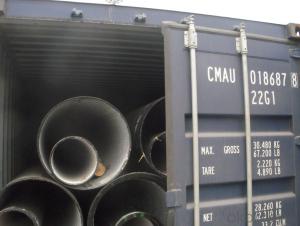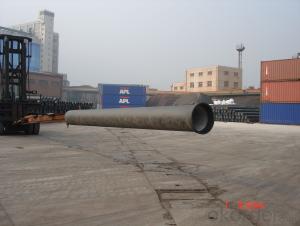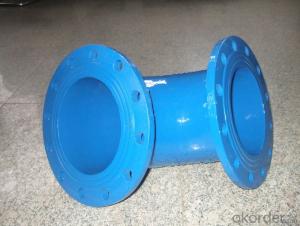DUCTILE IRON PIPES C Class DN1600
- Loading Port:
- China Main Port
- Payment Terms:
- TT OR LC
- Min Order Qty:
- -
- Supply Capability:
- -
OKorder Service Pledge
OKorder Financial Service
You Might Also Like
Ductile Iron Cast Pipe is without any defects compare with tradition casting tech, which has many advantages particularly as follow:
(1) High density. In the "vertical upward casting" process, the melt iron of centre liquid column in center crystallizer is continuously feeding for volume shrinkage caused by condensation tube at outer circumference , which lead to be free of shrinkage porosity.
(2) High purity. When melt iron pouring, the mixed impurities such as gas, dross, sand grain which are lighter than melt iron could be eliminated at furnace mouth, its impossible to enter into the crystallizer through the channel, so the melt iron into the crystallizer is very pure.
(3) Strength with toughness. The cooling speed provided by continuous crystallizer is 30 times than sand casting and 5 times than centrifugal casting, and doesn't produce white iron, the eutectic cell volume of continuous cast iron is one eighth to one tenth compare with traditional cast iron. The density of graphite nodule in ductile iron can reach 300-700 pcs/mm2. Therefore, all reason above improve the strength and toughness of continuous cast iron.
(4) Free machining. The high speed cooling make the hardening phase (such as boride, steadite) not appear like reticular, massive or thick, but diffuse like fish bone and pane in shape, moreover, there are tiny graphite flakes inlaid hardening phase. It's free machining in BrinellHardness the range of 250-300HB. However, the Brinell Hardness of 250 is top limit to common metal materials.
(5) Uniform composition of tube wall. The convection mixing of liquid column caused by marching type drawing in crystallizer make the composition of tube wall well-distributed, and concentration gradient very little.
(6) High productivity. To the wall thickness of tube under 10mm, the speed of continuous casting is 1 meter/min, to the wall thickness of tube under 20mm, the speed of continuous casting is 0.5 meter/min, which is high efficiency that centrifugal or other casting tech couldn't reach.
- Q:Are ductile iron pipes suitable for road crossings?
- Indeed, road crossings can indeed be suitably accommodated by ductile iron pipes. Given its robustness and durability, ductile iron proves to be exceedingly appropriate for subterranean installations, specifically road crossings. These pipes exhibit remarkable tensile strength, enabling them to endure substantial loads and traffic pressures without succumbing to fractures or breakages. Moreover, ductile iron pipes showcase exceptional resistance to corrosion, guaranteeing their durability even in the harshest of environments. Not to mention, their effortless installation and upkeep render them a dependable option for road crossings.
- Q:Can ductile iron pipes be used for seawater intake systems?
- Yes, ductile iron pipes can be used for seawater intake systems. Ductile iron is a type of cast iron that is known for its high strength, durability, and resistance to corrosion. These properties make it well-suited for various applications, including seawater intake systems. Seawater is highly corrosive due to its high salt content, and regular cast iron pipes may be susceptible to corrosion and damage over time. However, ductile iron pipes have a protective coating that acts as a barrier against corrosion, allowing them to withstand the harsh conditions of seawater. Additionally, ductile iron pipes have a higher tensile strength compared to regular cast iron pipes, making them more resistant to the high pressures and stresses associated with seawater intake systems. Overall, ductile iron pipes are a reliable and cost-effective choice for seawater intake systems.
- Q:Are ductile iron pipes suitable for power plant cooling systems?
- Yes, ductile iron pipes are suitable for power plant cooling systems. Ductile iron pipes offer several advantages that make them ideal for such applications. Firstly, ductile iron is known for its high strength and durability, making it capable of withstanding the high pressure and heavy loads often associated with power plant cooling systems. Additionally, ductile iron pipes have excellent resistance to corrosion, which is crucial in an environment where water and other cooling fluids are constantly flowing. Furthermore, ductile iron pipes have good thermal conductivity, meaning they can efficiently transfer heat away from the power plant equipment, contributing to the overall cooling process. Lastly, ductile iron pipes are also cost-effective compared to other materials commonly used in power plant cooling systems, making them a practical choice for such applications. Overall, ductile iron pipes are a reliable and suitable option for power plant cooling systems due to their strength, corrosion resistance, thermal conductivity, and cost-effectiveness.
- Q:Can ductile iron pipe be used for wastewater treatment plant applications?
- Yes, ductile iron pipe can be used for wastewater treatment plant applications. It is known for its durability, corrosion resistance, and ability to withstand high-pressure environments, making it suitable for transporting wastewater in such facilities.
- Q:Are ductile iron pipes suitable for use in oil refineries?
- Yes, ductile iron pipes are suitable for use in oil refineries. Ductile iron is a type of cast iron that offers a unique combination of strength, durability, and flexibility, making it an excellent choice for various applications, including oil refineries. One of the key advantages of ductile iron pipes is their high tensile strength, allowing them to withstand the high pressure and stress commonly found in oil refining processes. This strength is crucial for the transportation of various fluids, including crude oil, refined petroleum products, and chemicals within the refinery. Additionally, ductile iron pipes have excellent corrosion resistance properties, making them highly resistant to the corrosive effects of oil, chemicals, and other substances typically present in oil refineries. This corrosion resistance ensures the longevity and reliability of the pipes, reducing the need for frequent maintenance and replacement. Furthermore, ductile iron pipes have exceptional ductility, which means they can absorb and withstand significant impacts and vibrations without fracturing or breaking. This quality is advantageous in oil refineries where there may be frequent movement or potential stressors due to machinery, equipment, or ground settlement. Moreover, ductile iron pipes have a smooth interior surface that reduces friction, allowing for efficient fluid flow and minimizing pressure loss. This characteristic is essential in oil refineries, as it helps optimize the transportation of fluids, ensuring a smooth and reliable production process. In conclusion, ductile iron pipes are suitable for use in oil refineries due to their high tensile strength, corrosion resistance, ductility, and smooth interior surface. These pipes provide a reliable and durable solution for transporting various fluids within the refinery, contributing to the efficient and safe operation of oil refining processes.
- Q:How are ductile iron pipes protected against interior corrosion?
- Cement mortar lining is utilized to protect ductile iron pipes against interior corrosion. This process involves the application of a layer of cement mortar to the inner surface of the pipe. By acting as a protective barrier, the cement mortar prevents the corrosive elements in the water or fluid from directly contacting the iron material. To apply the cement mortar lining, the interior surface of the ductile iron pipe is initially prepared by removing any loose scale or debris. Next, a mixture of cement, sand, and water is prepared to create a paste-like consistency. Skilled workers can then manually apply this mixture to the interior surface of the pipe or use a spinning machine. Once the cement mortar lining is applied, it must cure for a specific period, typically around 24 hours. During this curing process, the cement mortar hardens and forms a dense protective layer on the pipe's inner surface. The cement mortar lining provides several advantages in safeguarding ductile iron pipes against corrosion. It creates a smooth and continuous surface that prevents direct contact between the water or fluid and the iron material, thus reducing the risk of corrosion. Additionally, the lining helps to minimize friction within the pipe, thereby enhancing flow efficiency. It is crucial to regularly inspect and maintain the cement mortar lining to ensure its effectiveness in preventing corrosion. Over time, the lining may develop cracks or deteriorate, compromising its protective properties. Therefore, periodic inspections are necessary to repair or replace the lining as required, ensuring the integrity of the ductile iron pipes and preventing interior corrosion.
- Q:Can ductile iron pipes be used for geothermal systems?
- Indeed, geothermal systems can utilize ductile iron pipes. Renowned for their strength, durability, and resistance to corrosion, ductile iron pipes prove fitting for diverse applications, including geothermal systems. With the ability to withstand elevated temperatures and fluctuations in pressure, commonly encountered in geothermal systems, these pipes excel. Moreover, they possess exceptional thermal conductivity, facilitating efficient heat transfer between the geothermal fluid and the surrounding environment. Consequently, ductile iron pipes represent a feasible choice in transporting geothermal fluids within geothermal systems.
- Q:What are the different types of coatings available for ductile iron pipe?
- There are several different types of coatings available for ductile iron pipe, each with unique properties and advantages. 1. Cement Mortar Coating: This is a commonly used coating for ductile iron pipe. It involves applying a layer of cement mortar to the interior and exterior surfaces of the pipe. This coating provides protection against corrosion and abrasion, as well as improving the hydraulic efficiency of the pipe. 2. Polyethylene Encasement: Another popular coating for ductile iron pipe is polyethylene encasement. This involves wrapping the pipe with a layer of polyethylene material. This coating provides excellent corrosion resistance and is particularly effective in protecting against soil and water contaminants. 3. Fusion-Bonded Epoxy (FBE) Coating: FBE coating involves applying a layer of epoxy powder to the pipe surface, which is then heated to create a strong bond. This coating provides excellent corrosion resistance and is commonly used in aggressive environments such as wastewater treatment plants and chemical processing facilities. 4. Zinc Coating: Zinc coating, also known as galvanization, involves applying a layer of zinc to the surface of the ductile iron pipe. This coating provides excellent corrosion resistance and is often used in outdoor applications where the pipe is exposed to moisture and humidity. 5. Bituminous Coating: Bituminous coating is a black, tar-like substance that is applied to the surface of the pipe. It provides protection against corrosion and is commonly used in underground applications where the pipe is in contact with soil or water. 6. Polyurethane Coating: Polyurethane coatings provide excellent resistance to abrasion, impact, and chemical corrosion. They are often used in aggressive environments such as oil and gas pipelines. These are just a few examples of the different types of coatings available for ductile iron pipe. The choice of coating depends on factors such as the intended application, environmental conditions, and the level of corrosion protection required. It is important to consult with industry experts and adhere to relevant standards and specifications when selecting a coating for ductile iron pipe.
- Q:Are ductile iron pipes suitable for horizontal directional drilling (HDD) installations?
- Yes, ductile iron pipes are suitable for horizontal directional drilling (HDD) installations. They possess the necessary strength and flexibility to withstand the drilling process and can be easily installed underground without compromising their structural integrity.
- Q:Can ductile iron pipes be used for geothermal heating and cooling systems?
- Yes, ductile iron pipes can be used for geothermal heating and cooling systems. Ductile iron pipes are known for their strength and durability, making them suitable for underground applications like geothermal systems. They can withstand the high temperatures and pressure variations associated with geothermal heating and cooling, making them a reliable choice for this purpose.
1. Manufacturer Overview |
|
|---|---|
| Location | |
| Year Established | |
| Annual Output Value | |
| Main Markets | |
| Company Certifications | |
2. Manufacturer Certificates |
|
|---|---|
| a) Certification Name | |
| Range | |
| Reference | |
| Validity Period | |
3. Manufacturer Capability |
|
|---|---|
| a)Trade Capacity | |
| Nearest Port | |
| Export Percentage | |
| No.of Employees in Trade Department | |
| Language Spoken: | |
| b)Factory Information | |
| Factory Size: | |
| No. of Production Lines | |
| Contract Manufacturing | |
| Product Price Range | |
Send your message to us
DUCTILE IRON PIPES C Class DN1600
- Loading Port:
- China Main Port
- Payment Terms:
- TT OR LC
- Min Order Qty:
- -
- Supply Capability:
- -
OKorder Service Pledge
OKorder Financial Service
Similar products
New products
Hot products
Hot Searches
Related keywords



























